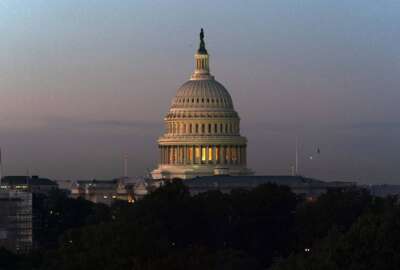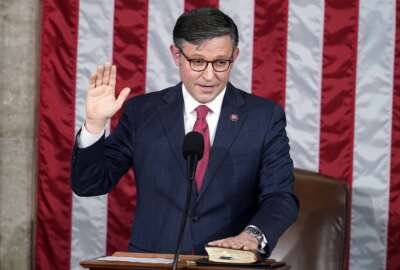Hubbard Radio Washington DC, LLC. All rights reserved. This website is not intended for users located within the European Economic Area.
Huge end-of-the-year deadlines looming in Congress
Congress is back from its Thanksgiving recess this week -- with not very much time to go before several different impending deadlines. We've talked a lot about ...
Congress is back from its Thanksgiving recess this week — with not very much time to go before several different impending deadlines. We’ve talked a lot about the appropriations legislation that still needs to get done for 2024. But the deadlines for some key authorization bills are creeping up even faster. Loren Duggan is deputy news director at Bloomberg Government. He spoke with Federal News Network Deputy Editor Jared Serbu on the Federal Drive with Tom Temin
Interview Transcript:
Jared Serbu He joins us now with what’s ahead on the Hill this week. And Loren, I guess Congress is nominally back in session this week, but not a lot of indication that we’re going to see a lot of progress on the floor as we’re really facing kind of three different deadlines near the end of the year, right?
Loren Duggan That’s right. There’s obviously the end of the year where some key provisions expire and that always drives action. And then there’s the two key deadlines set up for next year by the stopgap bill that Congress passed right before Thanksgiving, January 19th and February 2nd. Two deadlines that once they get back from the winter holidays are really going to force a lot of action and something that Congress is going to have to reckon with, even though it doesn’t seem today to have a plan to get to that point.
Jared Serbu And so since I guess the first deadline, the end of the calendar year, those authorization bills that you mentioned, including the NDAA. Reasonable to expect that. That’s where we’ll probably see most of the focus between now and the end of December.
Loren Duggan That’s right. The two big authorizations they’ll have to deal with, one is the NDAA or Defense Authorization Act. That one they want to do by the end of the year because some of the authorities in there expire. They want to take care of issues like troop pay and give those important authorities for people to buy things going into the next year, even if they’re waiting for the funding to actually come from the appropriations bill. The other one is the Federal Aviation Administration that’s operating under an extension of its authorization, in addition to the C.R. that currently expires December 31st. And it wasn’t extended as part of that deal. I think to keep pressure really on the committees that need to negotiate that in the House and the Senate to make progress there. It feels like NDAA is much further along. Both chambers passed a bill. They have a similar top line, but they have some details to work out. And I think at this point, leadership is probably the key factor in figuring out how that bill’s going to advance.
Jared Serbu And I think we don’t even quite know how that reconciliation process would come together. Right. I think in past years, there’s been sort of an informal conference committee and there really wasn’t a conference committee at all. Have we seen any indication of how those two bills are going to get reconciled? Because I don’t think the Senate has even named conferees.
Loren Duggan They did name conferees right before they left. That was kind of the chaser to passing the C.R. was to name their conferees and send that into those formal talks. The one luxury there is usually it’s just the Senate Armed Services Committee that does the negotiating on behalf of the Senate. They were names. But what they had said right before they left is a lot of the big things that they could resolve as authorizers that took care of. But some of the questions around policy riders and key things that leadership needed to weigh in on. Those are the sorts of things I think we’ll have to see reconciled in the next couple of weeks to get a final product that the House and the Senate can then take a vote on.
Jared Serbu And then looking ahead to those next appropriations deadlines, when the C.R., the laddered C.R., starts expiring, as far as I can tell, we’ve not seen a lot of indication that things are getting any easier on the appropriations front, no matter how long they delay this.
Loren Duggan That’s, I think, pretty fair because if you look at how the House and the Senate have approached this project, the House has made a lot of progress. They’ve passed some bills. They’ve even gotten bills on the floor and then had to pull them back even if they didn’t have the votes. But they’d say, look, we’ve had a lot of progress. We’ve had a lot of debate. But there’s a sizable gap between the House and Senate approaches, like $100 billion, which is a significant amount of money. And then there’s the riders that the House Republicans have put into the bill with bills which has actually caused some of the issues with the final pieces of legislation where the mix of cuts and policy changes was enough that they couldn’t get them across the line in the House. Even so, negotiating between those more partisan party line House bills and the more bipartisan bills in the Senate, that’s going to be difficult. The Senate has talked about doing another package of maybe four bills that would make progress, get four more bills with a chance for lawmakers to make amendments and debate what’s in there. We’ll see if they can get to that either this year or early next year. But getting to that final version of bills, some package of them that can get across the line and to the president’s desk still feels like a tall order with a lot of questions unresolved.
Jared Serbu And then looking beyond authorizations and appropriations, I think you’re watching for the Senate to make some progress on nominees. What are you looking for there this this coming week and weeks?
Loren Duggan That’s right. Majority Leader Charles Schumer before they left, set up a couple of votes this week on some judges, which that’s been part of the effort, theirs to move some judges forward, some of the remaining nominees that are there for different positions across the administration. So I would expect the Senate to chip away at that as they’ve done, you know, throughout the year. One question still hanging over a lot of this. Are the military promotions that have been held up by Senator Tommy Tuberville of Alabama. There was a Senate Rules Committee vote to potentially change the rules on those to allow them to move in big packages rather than one by one. We’ll see if that battle is rejoined here. That was another thing that right before they left town, Republicans, even if they weren’t supportive immediately of the rules change, were trying to put pressure to move those nominations along. So that will be another busy part of the Senate’s agenda for the rest of the year.
Jared Serbu And even if we don’t see much progress on the floor, there are going to be some committee hearings where we’ll see at least possibly some fireworks, including a federal telework hearing coming up later this week, right?
Loren Duggan That’s right. That’s been a lingering issue for House Republicans who want to see more federal workers back in office buildings downtown and around the country. They are joined in that. I mean, the administration, President Biden, has said he wants to get more people back to their desks in offices. So this will be a chance for James Comer, the oversight chairman, and others on that committee to make the case. I think there’s a handful of agencies we’re coming up, maybe Social Security Administration, USAID and others. This isn’t the first time they’ve been on this subject. I don’t think it’s the last. That is language that maybe we could see something around in the spending packages as well. Be interesting to see how they approach that in either bills for the rest of this year or next year. But that question is far from resolved.
Copyright © 2024 Federal News Network. All rights reserved. This website is not intended for users located within the European Economic Area.
Jared Serbu
Jared Serbu is deputy editor of Federal News Network and reports on the Defense Department’s contracting, legislative, workforce and IT issues.
Follow @jserbuWFED





